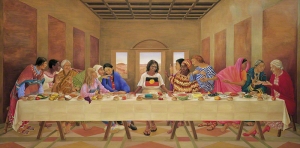The First Supper
The First Supper is a term that does not have a widely recognized definition in historical, religious, or cultural studies. Unlike the well-documented and theologically significant Last Supper, which refers to the final meal that Jesus shared with his Apostles in Jerusalem before his crucifixion, the concept of the "First Supper" does not hold a specific place in biblical texts, religious traditions, or historical accounts. Therefore, this article will not focus on a singular event but will explore the concept from a hypothetical standpoint, considering the potential significance such a term might hold in various contexts.
Potential Interpretations[edit | edit source]
Religious Context[edit | edit source]
In a religious context, one might speculate that "The First Supper" could refer to the initial meal shared by biblical figures, such as Adam and Eve in the Garden of Eden. This meal, not documented as a "supper" per se, could symbolically represent the beginning of human fellowship and communal sharing under the eyes of the divine.
Cultural and Historical Context[edit | edit source]
From a cultural or historical perspective, "The First Supper" might be used metaphorically to describe the first instance of communal eating among a group of people, marking the beginning of societal or cultural practices around food and communal gatherings. This could apply to the first recorded meal of a significant historical figure or the inauguration of a tradition.
Artistic Interpretation[edit | edit source]
In the realm of art, "The First Supper" could inspire interpretations or representations that parallel or contrast with the Last Supper, offering artists a canvas to explore themes of beginnings, innocence, or the establishment of community and tradition.
Hypothetical Significance[edit | edit source]
The concept of a "First Supper" invites speculation on the importance of beginnings and the establishment of communal bonds. It could serve as a symbol for unity, the inception of tradition, or the birth of cultural practices surrounding food and fellowship. In religious narratives, such a meal might underscore themes of innocence, purity, and divine providence at the dawn of human history.
Conclusion[edit | edit source]
While "The First Supper" does not correspond to a specific event or tradition in religious, historical, or cultural records, it offers a fertile ground for interpretation and speculation. The idea prompts reflection on the origins of communal meals and their significance in shaping human relationships, traditions, and beliefs.
This disambiguation page lists articles associated with the title The First Supper.
Search WikiMD
Ad.Tired of being Overweight? Try W8MD's physician weight loss program.
Semaglutide (Ozempic / Wegovy and Tirzepatide (Mounjaro / Zepbound) available.
Advertise on WikiMD
|
WikiMD's Wellness Encyclopedia |
| Let Food Be Thy Medicine Medicine Thy Food - Hippocrates |
Translate this page: - East Asian
中文,
日本,
한국어,
South Asian
हिन्दी,
தமிழ்,
తెలుగు,
Urdu,
ಕನ್ನಡ,
Southeast Asian
Indonesian,
Vietnamese,
Thai,
မြန်မာဘာသာ,
বাংলা
European
español,
Deutsch,
français,
Greek,
português do Brasil,
polski,
română,
русский,
Nederlands,
norsk,
svenska,
suomi,
Italian
Middle Eastern & African
عربى,
Turkish,
Persian,
Hebrew,
Afrikaans,
isiZulu,
Kiswahili,
Other
Bulgarian,
Hungarian,
Czech,
Swedish,
മലയാളം,
मराठी,
ਪੰਜਾਬੀ,
ગુજરાતી,
Portuguese,
Ukrainian
Medical Disclaimer: WikiMD is not a substitute for professional medical advice. The information on WikiMD is provided as an information resource only, may be incorrect, outdated or misleading, and is not to be used or relied on for any diagnostic or treatment purposes. Please consult your health care provider before making any healthcare decisions or for guidance about a specific medical condition. WikiMD expressly disclaims responsibility, and shall have no liability, for any damages, loss, injury, or liability whatsoever suffered as a result of your reliance on the information contained in this site. By visiting this site you agree to the foregoing terms and conditions, which may from time to time be changed or supplemented by WikiMD. If you do not agree to the foregoing terms and conditions, you should not enter or use this site. See full disclaimer.
Credits:Most images are courtesy of Wikimedia commons, and templates Wikipedia, licensed under CC BY SA or similar.
Contributors: Prab R. Tumpati, MD

